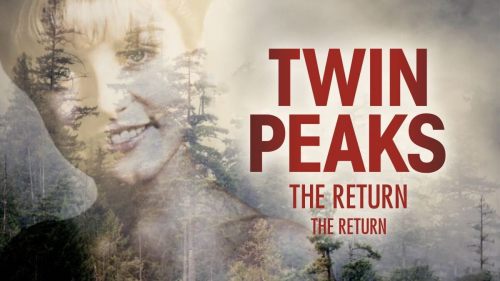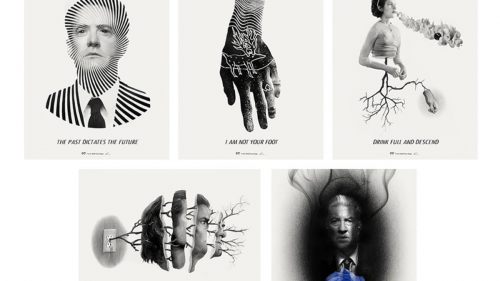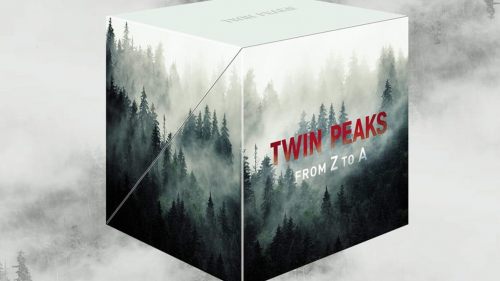TWIN PEAKS: THE RETURN Review: Parts 17 & 18
We really don’t give Gordon Cole (or David Lynch, for that matter) enough credit for how well he delivers exposition. With a character like Cole, there’s no need for a “previously on” bumper. Whenever he fills Albert (Miguel Ferrer) in on details he’s sincerely sorry for never disclosing before now, he’s also clueing us in to exactly what the fuck is going on. At the top of Part 17, it’s like a surrealist speed read recap of key Blue Rose Task Force plot points we’ve been hazily experiencing for the last sixteen hours (including the nefarious entity “Judy” Phillip Jeffries [David Bowie, now played by a teapot] was once shouting about all the way back in Fire Walk With Me).
Now, it’s all coming to a head. Cooper’s returned, and is en route to Washington with the Mitchum Bros. (a fact Gordon learns through Dougie’s boss). Dougie’s gone (or at least being regrown into a better Dougie somewhere in the universe). Mr. C is barreling toward Twin Peaks like a freight train. The final showdown is here, and it’s somewhat surprising (not to mention impressive) how David Lynch and Mark Frost built this relentless momentum inside a narrative so fragmented and sprawling.
The Mexican standoff occurs in Sherriff Truman’s office, as Mr. C arrives, startling Andy (Harry Goaz) and Lucy (Kimmy Robertson), but of course looks like the complete stranger he is to Frank Truman (Robert Forster). This unfamiliarity allows Lynch and Frost to set up one of the most suspenseful moments in the entire series, as a sit down turns into a bullet fiesta once Cooper calls, confirming Truman’s sneaking suspicion that there’s something off about this leathery mutant seated on the other side of his desk. Guns are drawn, but it's Lucy (of all fucking people) who smokes the evil double, the cheery sound of everybody’s favorite FBI agent alerting her to the nasty presence who’s slithered its way into their precinct. Mr. C’s quarry (the eyeless Naido [Nae Yuuki]), and his former agent (Chad [John Pirruccello]) break out of the prison cells, along with James Hurley (James Marshall) and his Hulk Hands Brit sidekick, Freddie (Jake Wardle).
In a scene that plays like something out of a lost Phantasm (’79) sequel, Mr. C’s body is torn to pieces by the Woodsman’s (Robert Broski) shadowy dumpster hobo accomplices, unleashing the seed of BOB (Frank Silva). This shrieking silver sphere relentlessly assaults Freddie, who gathers up the courage to embrace his destiny and smashes the Christmas ornament from hell into a thousand pieces. Naido is transported back to the Red Room, where her face is torn open and unleashes Diane (Laura Dern) – only now it’s the real woman Cooper’s lovingly catalogued his existence for this whole time. Sporting a bright red wig, the two embrace, kissing passionately while Cooper’s face is superimposed on the frame. “We live inside a dream,” he flatly intones, but the adventure continues as his words echo into oblivion, calling everything we’re watching into question. Are we awake? Is anyone awake? Cooper bids his friends adieu before disappearing into Room 315 of the Great Northern, sending him back to another time we recognize.
Through the darkness of future past
The magician longs to see
One chance out between two worlds:
Fire walk with me.
Would that it were so simple. The evil might appear to be vanquished, but Cooper must still consult with a fallen colleague, in order to obtain the key to a dictating past. Phillip Jeffries unveils the secret to its entrance, and Cooper finds Mike, who recites the aforementioned poem that’s been repeated in both the original series and David Lynch’s Fire Walk With Me (’92). In perhaps the boldest move in a revival filled with subversions of expectation, Coop travels back into the past and witnesses the last moments of the life of Laura Palmer (Sheryl Lee). Riding on the back of James’ bike, the two stop in the middle of the forest and, before they can follow through with their plan to escape this nothing town, spots the agent in the branches and screams. We finally know what derailed Laura’s path to freedom on that fateful evening. It was Cooper – trying desperately to return and warn her of the deadly change that’s ahead.
Lynch replays an entire chunk of the ending from Fire Walk With Me; only the color is gone, as is Angelo Badalamenti’s swelling, hyper-dramatic score. But we don’t need these filmic elements any longer. We know what’s going to happen, and that we’re now situated directly in the path of destiny itself, as Cooper climbs down out of the tree and offers Laura his hand. If she follows the agent out of the woods, the whole of existence transforms. Her father (Ray Wise) never sacrifices her on the altar of evil men. Pete Martell (Jack Nance) never finds her body, all wrapped in plastic. Twin Peaks is never poisoned to its core. Dale Cooper never even steps foot into the municipality. The Log Lady (Catherine E. Coulson) was right about “all goodness” being in jeopardy, and Laura being the boughs of innocence that break once the fire’s started. It’s David Lynch and Mark Frost’s Last Temptation of Christ (’88) moment – giving us a glimpse of what life could be like if the crucified were allowed to step down off their cross and wander out of the darkened wilderness.
Or is it more like Spike Lee’s 25th Hour (’02)? A fairy tale as to what could’ve been, had Cooper actually been strong enough to lead Laura from said blackness. Sarah Palmer (or whatever Laura’s mother [Grace Zabriskie] has become – “Judy” perhaps?) smashes the prom queen’s picture, and the girl is torn from Cooper’s hand, her iconic screams echoing into nothingness. Julee Cruse takes the stage at the Roadhouse to sing us off into oblivion (“The World Turns”). This is Lynch working in supreme melancholy horror mode, hoping beyond hope that love hasn’t gone away and can return to this awful plane. But as we’ve just witnessed, not even a force of good as powerful as Cooper may be able to intervene while absolute corruption is occurring.
Lynch and Frost’s final hour may be one of the most confounding instances of an epilogue in filmed history. Dougie is regrown and reunited with his family, while Cooper is released after a brief chat with the Arm (which feels strangely similar to how The Return began). He rejoins with Diane and the two travel back to the world, driving along in a car before reaching a precise spot at a precise time. Coop can sense the electricity in the air, buzzing around them. This is it. This must be the place.
After a final assurance to one another, Cooper and Diane roll through, and reality distorts around them – shifting time and location to another realm we haven’t yet explored. Here they’re different people (Richard and Linda), making love in a motel before Diane walks out on Coop the next morning, leaving a note that whatever they had between them is gone now. “Linda and Richard?” He wonders, echoing the same confusion that’s probably going through the minds of everyone at home. Who are these new entities? Why did “Linda” cover “Richard’s” face while they fucked? Is it just how Diane knew Mr. C wasn’t Cooper on that one horrible day all those years ago?
This Cooper is different from the virtuous hero we’ve known all these years. He still drinks coffee. He still has an FBI badge and gun. But he’s stiffer. His tone sounds more like Mr. C. When a group of cowboys harass a server in a diner, he violently confronts them, and then demands the name of the waitress whose day off it is. The server complies, and “Richard” finds “Carrie” (Sheryl Lee) at a run down Odessa, Texas ranch house. He asks if her name is Laura, but she’s never heard of such a girl. With some scattered details about Carrie’s parents, Cooper convinces this New Laura to drive back with him to Twin Peaks, so he can “take her home.” Carrie’s already got to get out of Dodge anyways, as there’s a man shot dead in her living room (a husband? boyfriend?). In trademark Lynchian fashion, this waitress may not be our Laura, but she’s certainly another one of his classic women in trouble, ready to desert whatever oppressive forces caused her to resort to murder.
The drive back to Twin Peaks is long and quiet. Both “Richard” and “Carrie” become paranoid that a car is following them, but it simply passes and speeds off. Upon arriving at the Palmers’ old home, its new owner (Mrs. Tremond) relays that no Palmers ever lived here. The Chalfonts (sound familiar?) sold the house to them, and her family’s been there ever since. Cooper politely thanks the woman, and then wanders into the street with Carrie. “What year is it?” The stranger in a black suit asks, and the waitress looks up at the house, her eyes going wide with terror as it transmutes into a lifeless void. The Palmers may not be present, but the whispering malevolence of a mother’s voice remains. Carrie screams and screams, and the screen cuts to black. It’s the most unnerving moment of television this side of Journey’s “Don’t Stop Believing” cutting short from Tony Soprano’s diner jukebox. We realize that no answers are going to be provided. We’re never going to learn who Richard, Linda and Carrie are. We’re never going to see Twin Peaks again, or know how its residents ended up. Narrative collapses, and all that remains is elemental evil – Carrie and Laura becoming one as they’re confronted by a force that remains, no matter what dimension we’re currently surveying.
The lack of story resolution is no doubt frustrating; an inversion of the complex yet still somewhat straightforward narrative Lynch and Frost have been weaving for eighteen hours now. However, what if instead of getting caught up in the details and “rules” of the plot (or how any we’ve witnessed before apply to Lynch and Frost’s magnum opus), we ask the bigger questions it leaves us with? What if the world is full of Coops and Lauras – some looking to save the other, and not recognizing that they’re doomed to fail every time? Just as BOB was supposed to represent the foulness that inhabits all men, maybe Coop will always be the good, striving to recognize the light in those like Laura, and keep them from being corrupted by these numerous abusive forces? For all of his linear abstractions, Lynch has always worked in broad strokes, thematically. So when Carrie/Laura screams at some unknown entity inhabiting the home that used to be hers (in the same fashion she shrieked at the trees in Fire Walk With Me), it could be a sign that we’re stuck with just another set of tragic figures, hoping that this time it won’t turn out as awful as it did the last. But the sadness that permeates the final slow motion frame, as the credits roll over Laura whispering some secret in a shocked Cooper’s ear, comes from the fact that the cycle may never be broken, no matter what year or part of the country we’re in. Evil remains, no matter what identity these avatars take, and must be battled against through the whole of infinity, or all will be lost.



